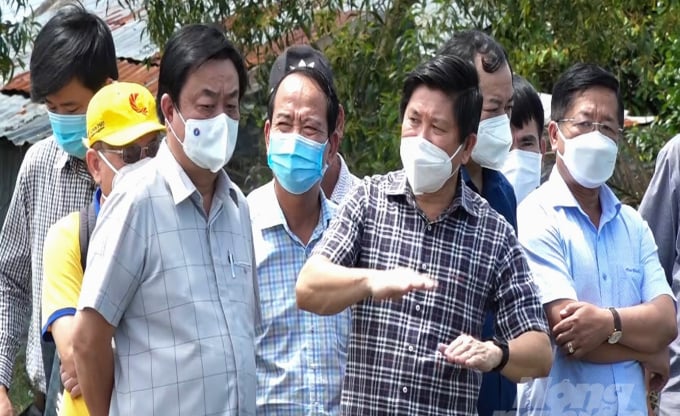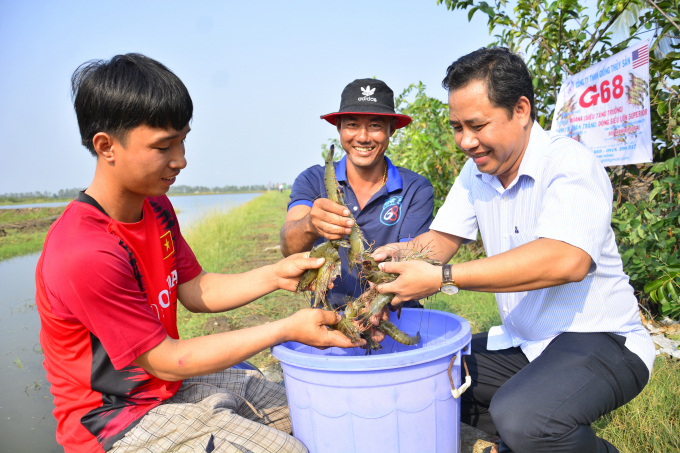May 24, 2025 | 16:27 GMT +7
May 24, 2025 | 16:27 GMT +7
Hotline: 0913.378.918
May 24, 2025 | 16:27 GMT +7
Hotline: 0913.378.918
Recently, Mr. Le Van Quang, General Director of Minh Phu Seafood Corporation (MPC), has proposed to Chairman of the National Assembly Vuong Dinh Hue on the construction planning of six sub-zones for Mekong Delta.
According to Mr. Quang, the MPC with its closed value model for the whole shrimp production chain, currently has 18 member companies including one in the US and another in Tokyo (Japan), with over 15,000 staff throughout the coastal provinces from Ninh Thuan to Ha Tien and Kien Giang.

Minh Phu Seafood Corporation representatives and a delegation from the Ministry of Agriculture and Rural Development led by Minister Le Minh Hoan survey a shrimp-rice growing model in Ca Mau at the end of September 2021. Photo: Trong Linh.
Mr. Quang assessed: “The Mekong Delta, with its diverse ecosystems, has a great potential for developing organic black tiger shrimp breeding as well as high-tech super-intensive shrimp farming. In addition, the Mekong Delta is a granary of rice and shrimp thus it has also a huge potential to increase its value to 20 times over the current figure with high competitiveness and high profits. However, the Mekong Delta needs to be planned properly and well, in the direction of 'favor of nature", adapting to climate change and sustainable development."
Accordingly, the MPC proposes to build six sub-zones as follow:
One is to focus on construction planning of marine urban regions with seaports and residential areas associated with boat berths and industrial zones favorable for processing fish and seafood products.
The second is to develop mangrove forests for raising shrimp, crabs and fish under the forest canopy so that to create a strip of mangrove forest 1-2 km wide running from Ha Tien to Vung Tau.
The third is to plan large enough high-tech super-intensive shrimp farming areas with the application of IoT and AI technologies to create high productivity and efficiency.

Mr. Le Van Quang assesses the potential of shrimp - rice farming in Mekong Delta is very large. Photo: LHV.
The fourth is to plan extensive shrimp farming areas large enough to create a biosecurity belt that will protect shrimp from infection of diseases and help achieve high survival rates and high profits.
The fifth is to plan concentrated shrimp processing and ancillary industrial zones associated with urban areas located in the center (to recruit workers for factories) and no more than five hours travelling by car from the material areas (to reduce the cost of salt storing, transportation and especially ensuring a good quality for the shrimp).
The sixth is to plan the shrimp-rice area large enough to create a bio-safety belt so that shrimp pathogens cannot penetrate the shrimp ponds. There, a concentrated residential area is separated from shrimp-rice farming, with freshwater reservoirs large enough to provide water for daily life and planting fruits.
According to Mr. Le Van Quang, with the above planning of six sub-zones, if it is carried out for each of coastal provinces in the Mekong Delta, with intra-regional and inter-regional transport connections, it will promote the advantages, specialty, and distinctiveness of each province. Planning zones can link cooperation, resonance to coordinate and increase the common strength.
Translated by Linh Nguyen

(VAN) The People's Committee of Tra Vinh province has approved an adjustment to the investment policy for the Green Hydrogen Plant project, increasing its area to approximately 52.76 hectares.
![Reducing emissions from rice fields: [2] Farmers’ commitment to the soil](https://t.ex-cdn.com/nongnghiepmoitruong.vn/608w/files/news/2025/05/05/dsc08881jpg-nongnghiep-140632.jpg)
(VAN) Clean rice cultivation model in Thuong Tan commune, Bac Tan Uyen district, is assisting local residents in achieving sustainable agriculture by substantially reducing costs, increasing productivity, and protecting the environment.

(VAN) At the conference to disseminate Resolution No. 68, AgriS introduced its digital agricultural ecosystem and reaffirmed its commitment to accompanying the Government in promoting private sector development and sustainable agriculture.

(VAN) 'Blue Ocean - Blue Foods' initiative is designed to restore marine ecosystems and establish sustainable livelihoods for local communities by cultivating a minimum of 1,000 hectares of cottonii seaweed in the first three years.
/2025/05/21/4642-3-112707_603.jpg)
(VAN) The V-SCOPE project has made direct contributions to three out of six pillars of the Comprehensive Strategic Partnership between Vietnam and Australia.

(VAN) Facing the threat of rabies spreading to the community, Gia Lai province urgently carries out measures to vaccinate dogs and cats on a large scale.

(VAN) Disease-free livestock farming not only protects livestock herds but also stabilizes production and livelihoods for many farmers in Tuyen Quang.